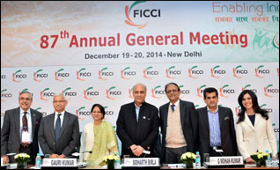|

|
Govt committed to make its policies more transparent: Top Officials
|
|

|
|
| Top Stories |
 |
|
|
|
SME Times News Bureau | 20 Dec, 2014
The government is committed to bringing about transparency, predictability and consistency in its policies across sectors for ease of doing business and making the work environment more conducive. This would catalyze private sector investments in diverse sectors and make the Prime Minister Narendra Modi's call to 'Make in India' a reality.
These sentiments were expressed by the Government Secretaries during a panel discussion on the theme 'Make in India: What does it take to Make in India?' on the eve of FICCI's 87th Annual General Meeting.
Amitabh Kant, Secretary, Department of Industrial Policy & Promotion, Ministry of Commerce & Industry, said that manufacturing was the key for pushing up economic growth. The government was focusing on ease of doing business by opening of FDI and work was in progress to roll out GST and bring about reforms in labour laws and the land acquisition Act.
However, he said, legacy issues remain which need to be addressed. He informed that the government was focused on reducing paper work, simplifying processes and was looking at integrating all platforms online.
On e-commerce, Kant said that India allows B2B commerce, the way China does. India, he said, was encouraging young B2B entrepreneurs to flourish and was promoting the B2B model in e-commerce by allowing 100 percent FDI.
He made clear that the government will not allow foreign investment in business-to-consumer (B2C) e-commerce for the time being to protect Indian ventures like Flipkart and Snapdeal from global competition, even as American giant Amazon asked the government to allow 49 percent foreign investment in the segment, reports media.
According to Rajeev Kher, Commerce Secretary, Ministry of Commerce & Industry, the major challenges were infrastructure, labour productivity and skill development and identified SEZ as a priority area which needs to have a clear mandate.
He added that by February 28, next year, it is expected that the issues of MAT and DTA would be addressed. Also, to optimize SEZ infrastructure the government would soon notify the dual use of infrastructure.
Kher said the Foreign Trade Policy which is on the anvil will give a new direction to India's foreign trade. He said FTAs must be seen in light of the present global situation, where only the US and Africa were showing growth potential. Hence, FTAs will not be driven by political or short-term consideration; but by long-term plans.
Gauri Kumar, Secretary, Ministry of Labour and Employment, said that industry needs to see the Ministry as a partner and not as an adversary. On global competitiveness of India, she said that the government was working strongly on vocational training and technical education and was focused on improving the standard of vocational training. In this regard, flexi MoUs have been introduced to train manpower and a career portal was coming up to connect employers with the right talent for their industry.
On labour laws, she said that governance reforms and legislative reforms were the two aspects which the government was looking at. While governance reforms were easier to bring about, legislative reforms would take time.
Kumar added that the Centre was now working closely with the state governments to bring about convergence. "We have put a single law for MSMEs to make it simple," she said.
G Mohan Kumar, Secretary-Defence Production, Ministry of Defence, said that the challenge for the sector was to transform defence production in such a way that the private sector has a major role to play.
The government was working towards creating a level-playing field for the private sector as defence production has so far been dominated by the public sector. He added that there were other impediments in defence production such as the Land Acquisition Act, where bottlenecks have been identified.
On FDI in defence, Kumar said that FDI has emerged as an excellent process and high-end companies of developed countries were showing interest in coming to India and dialogues were on with several parties. While the sector has seen low investment in the last 10 years, but large amounts FDI is expected to flow into the sector in the wake of new FDI norms.
|
|
|
| |
|
|
|
|
|
|
|
|
|
|
|
|
|
|
| |
| Customs Exchange Rates |
| Currency |
Import |
Export |
US Dollar
|
66.20
|
64.50 |
UK Pound
|
87.50
|
84.65 |
Euro
|
78.25
|
75.65 |
| Japanese
Yen |
58.85 |
56.85 |
| As on 13 Aug, 2022 |
|
|
| Daily Poll |
 |
 |
| PM Modi's recent US visit to redefine India-US bilateral relations |
|
|
|
|
|
| Commented Stories |
 |
|
|
|
|
|
| |
|